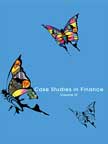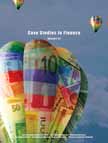The Société Générale Fiasco - Lessons in Risk Management
|
|
ICMR HOME | Case Studies Collection
Case Details:
Case Code : FINC052
Case Length : 24 Pages
Period : 2005-2008
Pub. Date : 2009
Teaching Note :Not Available
Organization : Société Générale
Industry : Banking & Financial Services
Countries : France
To download The Société Générale Fiasco - Lessons in Risk Management case study (Case Code:
FINC052) click on the button below, and select the case from the list of available cases:


Price:
For delivery in electronic format: Rs. 400;
For delivery through courier (within India): Rs. 400 + Rs. 25 for Shipping &
Handling Charges
» Finance Case
Studies
» Short Case Studies
» View Detailed Pricing Info
» How To Order This Case
» Business Case Studies
» Area Specific Case Studies
» Industry Wise Case Studies
» Company Wise Case Studies
Please note:
This case study was compiled from published sources, and is intended to be used as a basis for class discussion. It is not intended to illustrate either effective or ineffective handling of a management situation. Nor is it a primary information source.
Chat with us

Please leave your feedback

|
|




<< Previous
Introduction Contd...
|
At Delta One, Kerviel was an arbitrage trader specializing in
the European stock markets. His main activity involved trading in Turbo Warrants
(Refer to Exhibit II for activities pertaining to Turbo Warrants at Société
Générale). Kerviel's main responsibilities included handling proprietary deals
in the futures market. He was required to purchase a portfolio of stock index
futures and at the same time, sell a similar mix of futures, with slightly
different value. His job was to take bets on small price differences between
futures contracts and not to place directional bets. However, instead of
maintaining a hedged position, Kerviel began placing unauthorized trades by
taking directional bets, which were initially in small amounts.
|

|
He covered these up with a fictitious counter portfolio, giving the impression that the risk arising in the first portfolio was hedged. His initial successes with taking unauthorized positions encouraged him to continue to take such positions.
|
|
By December 2007, he had made gains of over € 1.4
billion through such positions. By mid-January 2008, the compliance
officers at Société Générale found abnormalities pertaining to the
trades carried out by Kerviel and they informed the higher authorities
about them.
Kerviel admitted to the Head of Société Générale's investment banking
division that he had committed unauthorized trades and fictitious
transactions. The CEO of the bank, its board, and the Central Bank of
France were informed about these transactions and they decided to close
the trading positions that Kerviel had created. However, by that time,
the markets were falling sharply, and Société Générale had to incur a
loss of € 6.3 billion on unwinding these positions... |
Excerpts >>

|
|










